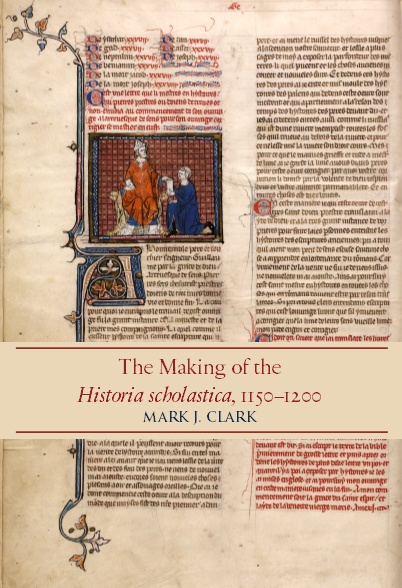
The Making of the Historia scholastica, 1150–1200
Studies and Texts 198; Mediaeval Law and Theology 7. xvi + 322 pp. • 2015 • ISBN 978-0-88844-198-0 • Cloth • $95
In the theological landscape of the later twelfth and early thirteenth centuries, Peter Comestor’s Historia scholastica stands out as a conspicuous yet strangely overlooked landmark. Like the Sentences of Peter Lombard, the History towers over the early scholastic period, and it was the extraordinary success of these twin towers that ensured the joint ascendancy of the reputations of the two masters. Indeed, we find one medieval writer after another testifying to the greatness of the man whose nickname had become synonymous with a voracious appetite for knowledge, and the encyclopedic work whose extraordinary dissemination and influence over several centuries made it the medieval popular Bible.
Based on wide and insightful reading of the manuscripts and printed texts not only of Peter Comestor but also of his master, Peter Lombard, and his student, Stephen Langton, this study offers a persuasive new argument about the genesis and formation of the Historia scholastica. At the same time it harnesses new evidence from biblical glosses and from Langton’s lecture courses to analyze the development and reception of the History at Paris in the decades between the 1160s and the 1190s.
In the course of this analysis, the History is revealed as a living, prototypically scholastic text, changing constantly at the hands of the magistri who, in adding to and altering the text, readily and anonymously placed their stamp on Comestor’s masterwork even as they used it in their teaching. That the History proved so malleable is a testament to Comestor’s genius, for he invented a novel method for introducing the Bible to students. Unlike the Gloss, the History presented just the historical/literal tradition and did so in a format that offered students both the scriptural text and the tradition of literal glosses in a single, unified historical narrative. Additionally, Comestor chose a felicitous narrative structure for the History, organizing its chapters into discrete topics that could be easily adapted to a master’s individual courses. By reorganizing biblical history in cogent fashion, and by establishing the narrative coherence of the salvific events related in the Old and New Testaments, Comestor charted a course in scholastic biblical education that was as fresh as it was to prove durable.
Author
Mark J. Clark received his doctorate in medieval history from Columbia University and is currently an associate professor of Church History and Historical and Systematic Theology in The School of Theology and Religious Studies at The Catholic University of America. His research focuses on the formation of the scholastic tradition, biblical as well as theological, from 1150 to 1350, and his many articles on Peter Lombard, Peter Comestor, and Stephen Langton have appeared in a number of prominent journals, including Mediaeval Studies, Medioevo, Recherches de théologie et philosophie médiévales, Revue bénédictine, and Sacris erudiri. In addition to a multi-volume edition and translation of the Historia scholastica together with the three versions of Langton’s course on the same, he is editing, with Timothy Noone, early thirteenth-century sources, both Franciscan and Dominican, for Saints Bonaventure and Aquinas, and also preparing critical editions of early-fourteenth-century works of Antonius Andreas and William of Alnwick.
Endorsements
“The Making of the Historia scholastica, 1150–1200 is without a doubt a seminal study of the first importance for the study of the history of medieval theology, and especially for the making in the mid-to-late twelfth century of one of the most influential books produced at that time. The Scholastic History of Peter Comestor is an encyclopaedic outline of the contents of the Bible presented from a historical point of view; it was destined to enjoy a phenomenal success for centuries to come. Mark Clark shows Comestor at work as a historian with a profound knowledge of previous scholarship, a masterful commentator on the literal sense of the stories found in Scripture, and a teacher in Paris whose colleagues included Peter Lombard and Stephen Langton.”
David Luscombe, The University of Sheffield
Ordering
Detailed information about ordering, including sales territories and methods of payment, is available on our ordering page. PIMS books are also available on Amazon.ca (for Canadian customers) and Amazon.com (for customers in the U.S.).


